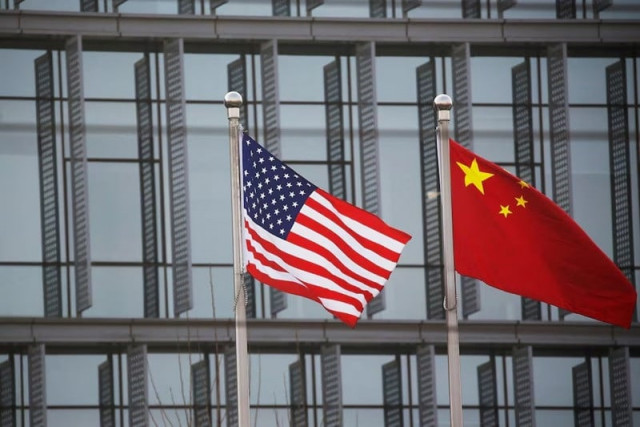US, China reach temporary deal
Slash tariffs over 100%; pact sparks 90-day economic optimism

A significant breakthrough in the global trade war has occurred, with the United States and China agreeing to substantially reduce tariffs on each other's goods for an initial period of 90 days. This agreement has led to a rise in global markets and a de-escalation of the trade war.
The agreement follows two days of negotiations in Geneva between US Treasury Secretary Scott Bessent and Chinese Vice Premier He Lifeng, and have concluded with both sides agreeing to decrease tariffs by 115%. As per the deal, the US will decrease tariffs on Chinese imports from 145% to 30%, however China will lower its tariffs on US goods from 125% to 10%.
International trade expert and economic strategist Dr Mehmoodul Hassan Khan said this agreement will open a window of opportunity for further meaningful consultations transforming their economies, communities and productive channels towards a better position, creating a win-win proposition for both the countries. Khan noted that both the US and China's Gross Domestic Products (GDPs), Gross National Products (GNPs), and industrial growths will be further strengthened, and their prospects of attracting more and more inflows of foreign direct investment will be further brightened. Additionally, their chances of joint ventures in diverse sectors of economies will be further accessible to both the countries.
According to the International Monetary Fund (IMF), the US and China together account for a significant share of the global economy, amounting to around 43% in 2024. Thus, any trade agreement between two sides would be a good omen for international trade and shipping industries, encouraging consumer markets to further collaborate for a beneficial equation for both the countries.
The accord has once again pushed sinking markets, industries, manufacturing factories, currencies and bonds markets to achieve the desired aims of economic productivity and avert an imminent recession, declining GDPs and growing budget deficits. Dr Khan said, "The agreement seems to have positive, productive and participatory effects on the global economy, international stocks, commodities, money and bond markets. It will have a multiplier socio-economic effect and compounding geopolitical and geo-strategic impacts on global supply chains, trading system, investments, joint ventures, and the pace of profitability of industrialisation, removing prevailing chaos and uncertainty."
Moreover, it marks substantial progress, resulting in a major reduction in bilateral tariffs and moving towards the normalisation of businesses, stability in foreign exchange management, and fostering global economic stability and sustainabilitythereby reducing the imminent chances of price hikes, inflation and recession. The agreement will definitely alleviate the shortage of essential items in major supermarkets and shopping centres across the US.
It has also saved the economic credibility of the World Trade Organisation (WTO), which has been facing lots of unseen pressure from the US government. It is a giant step towards economic globalisation, international cooperation and achieving the desired goals of global shared prosperity as well as a just and open global governance.
According to the joint statement, the parties commit to take the following actions by May 14: The US will (i) modify the application of the additional ad valorem rate of duty on articles of China (including articles of the Hong Kong Special Administrative Region and the Macau Special Administrative Region) set forth in Executive Order 14257 of April 2, by suspending 24 percentage points of that rate for an initial period of 90 days, while retaining the remaining ad valorem rate of 10% on those articles pursuant to the terms of said Order; and (ii) removing the modified additional ad valorem rates of duty on those articles imposed by Executive Order 14259 of April 8, 2025 and Executive Order 14266 of April 9.
China will (i) modify accordingly the application of the additional ad valorem rate of duty on articles of the US set forth in Announcement of the Customs Tariff Commission of the State Council No. 4 of 2025, by suspending 24 percentage points of that rate for an initial period of 90 days, while retaining the remaining additional ad valorem rate of 10% on those articles, and removing the modified additional ad valorem rates of duty on those articles imposed by Announcement of the Customs Tariff Commission of the State Council No. 5 of 2025 and Announcement of the Customs Tariff Commission of the State Council No. 6 of 2025; and (ii) adopt all necessary administrative measures to suspend or remove the non-tariff countermeasures taken against the United States since April 2.
After taking the aforementioned actions, the parties will establish a mechanism to continue discussions about economic and trade relations.
The representative from the Chinese side for these discussions will be He Lifeng, Vice Premier of the State Council, and the representatives from the US side will be Scott Bessent, Secretary of Treasury, and Jamieson Greer, US Trade Representative. These discussions may be conducted alternately in China and the United States, or a third country upon agreement of the Parties.























COMMENTS
Comments are moderated and generally will be posted if they are on-topic and not abusive.
For more information, please see our Comments FAQ